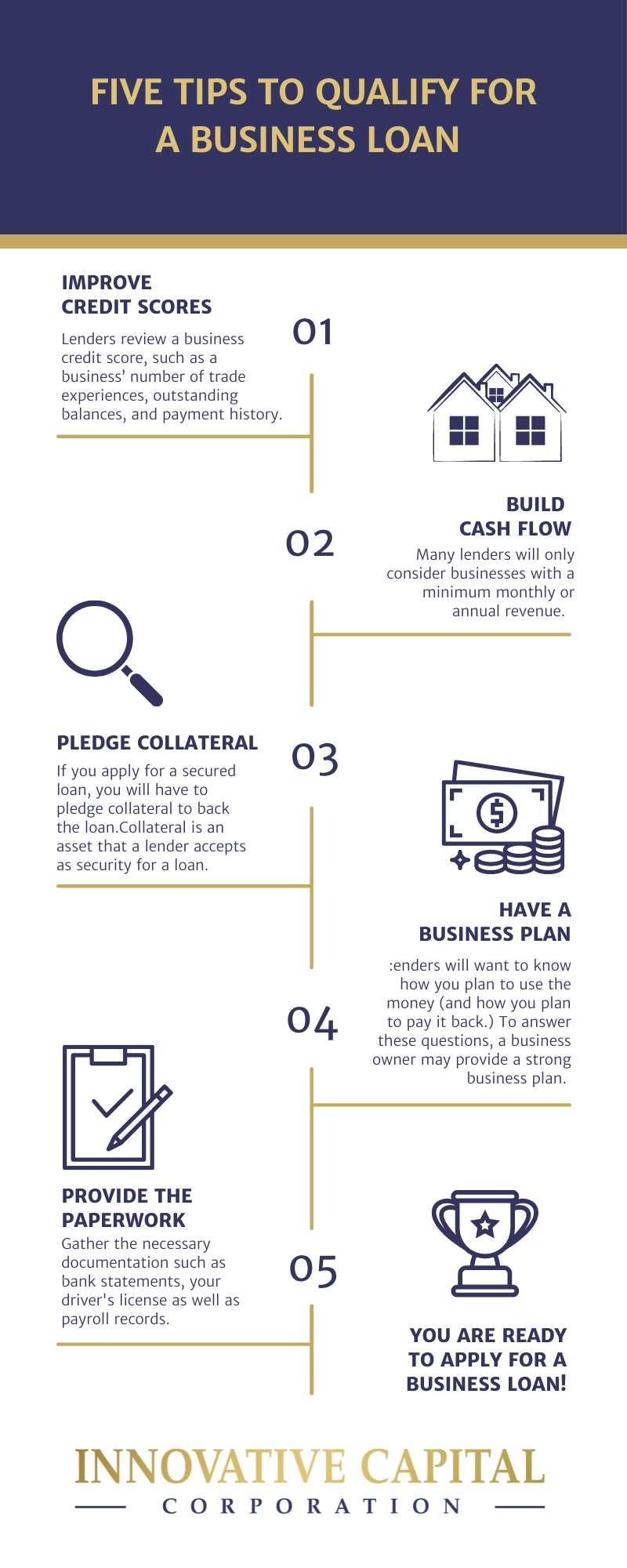Business owners can improve their chances of qualifying for a business loan by understanding lender requirements and implementing strategies to adjust their stats to meet requirements.
Take Steps to Improve Personal and Business Credit Scores
Business credit scores, ranging from zero to 100, are crucial to a business’s health and success. Lenders review various factors to calculate a business credit score. These factors include a business’ number of trade experiences, outstanding credit balances, payment history, and more.
Business owners can employ a few purposeful strategies to improve their credit scores quickly. These strategies include:
- Paying bills on time and in full
- Reducing credit utilization ratio
- Establishing credit accounts with suppliers
- Disputing any errors or inquiries
Build Cash Flow
A lender will often request a business’ bank statements and income tax returns to confirm earnings. Additionally, some lenders may also ask to review profit and loss statements to ensure a business maintains enough positive cash flow to afford the loan.
Many lenders will only consider businesses with a specified minimum monthly or annual revenue. For example, some lenders may require an annual revenue of $100,000 or $250,000 to qualify for a line of credit.
Methods to increase cash flow may include:
- Leasing instead of buying
- Improving or adjusting inventory
- Using high-interest savings accounts
- Conducting consumer credit checks
- Offering discounts for early payments
Struggling to Build Cash Flow?
According to Nerdwallet, “If you need a business loan with low revenue, you’ll likely have to rely on alternative financing options, like invoice factoring.” Invoice factoring is a type of invoice finance in which an owner sells a portion or all of the company’s outstanding invoices to a third party in order to improve cash flow and revenue stability. Learn more about our factoring options, here.
Be in Business For at Least Two Years
While minimum time requirements vary, traditional financial institutions, such as banks, typically require owners to be in business for at least two years.
However, alternative financing options may have less stringent requirements, but may still require around three to six months in business.
Understand Your Business Industry and Size
The industry that a business is in contributes to whether a business owner qualifies for a loan. Why? Each industry carries its own set of risk factors. Additionally, some lenders are restricted from working with particular industries. Business owners can contact the lender to check if they are eligible for a loan within their industry.
Nerdwallet offers the following guidelines:
- “You must be a for-profit company.
- You can’t operate in an ineligible industry, like real estate investing, gambling, or religious activities.
- You must be current on all government loans with no past defaults — you’ll be disqualified if you’ve been late on a federal student loan or government-backed mortgage, for instance.”
Have a Strong Business Plan and Loan Proposal
To put it simply, lenders will want to know how you plan to use the money (and how you plan to pay it back). To answer these questions, a business owner may provide a strong business plan. For example, an impactful business plan should:
- Introduce the business in an executive summary
- Present market research and competitive analysis
- Include a financial analysis and projections
- Explain the purpose of using the funds
- Discuss industry outlook
Forbes Advisor suggests that businesses “provide a lender with a detailed outline of how you intend to use the loan funds and include a five-year forecast of cash flow, income, and expenses.”
Offer Collateral or Personal Guarantee
Lenders provide both secured and unsecured loans. If you apply for a secured loan, you will have to pledge collateral to back the loan. Collateral is, in its simplest terms, an asset that a lender accepts as security for a loan. For example, a business owner may offer accounts receivable or real estate as collateral and a lender can seize these assets if they fail to repay the loan.
An unsecured loan, on the other hand, will not require collateral but will likely still come with a personal guarantee. While each lender has its own rules and practices, lenders typically ask for a blank lien on a business owner’s business assets. This gives the lender the ability to take these assets – such as real estate, equipment, or inventory – to recoup an unpaid loan.
Provide Business and Financial Documentation
Gather the necessary documentation. For instance, a lender will likely ask for some of all of the following items:
- Bank statements
- Personal and business tax returns
- Your driver’s license
- Business insurance plans
- Payroll records
- Incorporation documents
- Business plan
- Business licenses and permits
- Employee Identification Number (EIN)
- Proof of collateral
- Balance sheet
- Copy of your commercial lease
- Disclosure of other debt
- Accounts payable and accounts receivable aging
- Ownership and affiliations
- Legal contracts and agreements
Review the lender’s website or contact them before applying to ensure you include all of the necessary information.
Consider Alternative Lending
Alternative lending is also an attractive option for business owners who may struggle to follow the above tips or require access to capital quickly.
Alternative lending is a broad term referring to any type of lending that does not come from a traditional financial institution, such as a bank. Alternative financing is an option for those who need funding in a timely manner or are having difficulty being approved for traditional loans.
Alternative lending often has the benefits of:
- Quick approval turnaround
- Simple application process
- More lenient guidelines than traditional financing
- Reduced risk of depending upon a single source for funding
Learn more about alternative lending options, here.
Compare Lenders to Ensure You’re Getting the Best Fit
Borrowers seeking capital can apply for loans from a mix of both traditional institutions and alternative lending options in order to find the best rates. This will help borrowers get the rates they want and reduce their chance of devoting time to applying to one institution at a time only to get denied.
In an ideal situation, instead of casting out one line, the borrower could cast out multiple lines to connect with several lenders to underwrite the request simultaneously.
Luckily, that’s precisely what we do at Innovative Capital Corporation. Review our recently funded loans or current market rates, here.
Learn more about how to get the best deal as interest rates soar.



